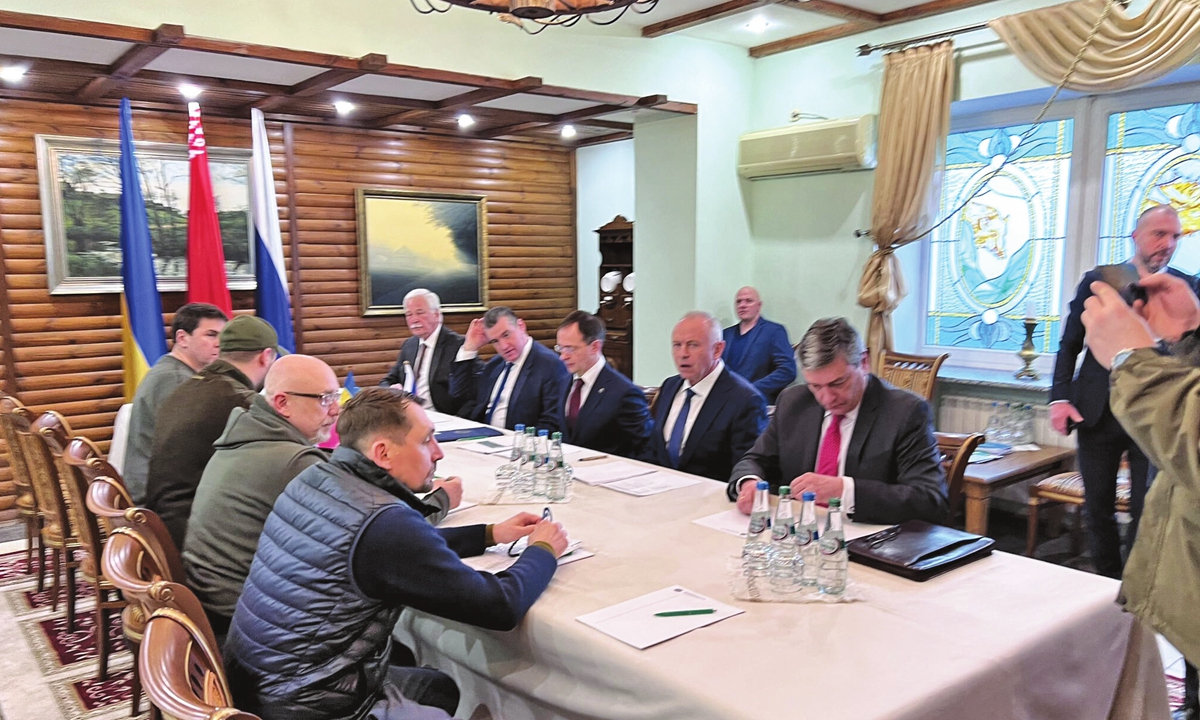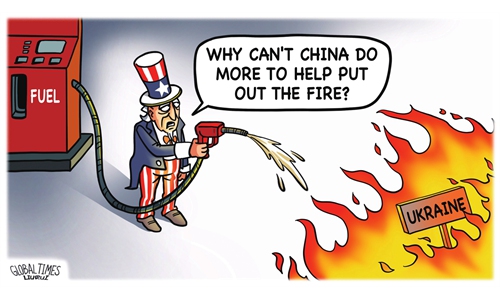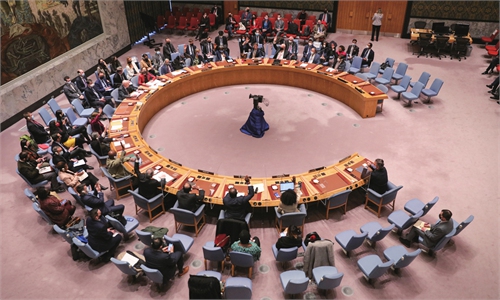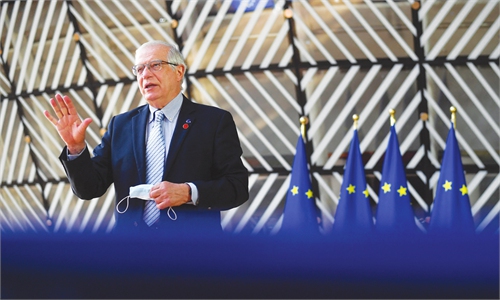If US keeps intensifying Ukraine crisis with sanctions, military deployments, 'mediation would be useless'

Delegations from Russia and Ukraine attend the second round of peace talks in Brest, Belarus on March 3, 2022. Photo: AFP
Click here to stay tuned with our live updates on Ukraine tensions.The US and the EU keep urging China to play a bigger role to "mediate" the Russia-Ukraine conflict, but in fact, Chinese analysts said that what the West wants is to push China to follow it to one-sidedly sanction Russia, without resolving the key security concerns of both sides, which was caused by US' long-standing strategy to poison Russia-Ukraine and Russia-EU ties.
If NATO keeps up its expansion to threaten Russia, and the US keeps intensifying the tension with sanctions, weapons supplies and military deployments, no one can promise the conflict would be effectively and fundamentally mediated, experts said on Sunday. They noted that Washington only wants to maximize the damage to Russia and use the situation to further legitimize its military presence in Europe, while the EU is much more sincere and desperate to ask for help as it's more directly affected by the conflict.
Chinese State Councilor and Foreign Minister Wang Yi on Saturday held a phone conversation with US Secretary of State Antony Blinken over China-US relations and the Ukraine issue at the latter's request.
Blinken briefed the Chinese side on the US' views and position on the current situation in Ukraine. Wang said that the evolution of the Ukraine issue is something China does not want to see.
The Ukraine issue is complicated, as it not only concerns the basic norms of international relations, but also is closely related to the security interests of various parties, Wang said, urging a focus on solving the current crisis and also maintaining the long-term stability of the region.
According to the US State Department, Blinken said that the world is acting in "unison" to "repudiate and respond to the Russian aggression, ensuring that Moscow will pay a high price."
Blinken is clearly not asking for peace mediation but is pressuring China to follow the US to sanction Russia, and his words are trying to beautify and justify the US-led sanctions against Russia, but in fact, there is no precedent that proves that Western sanctions could effectively mediate any conflict, Lü Xiang, a research fellow at the Institute of American Studies at the Chinese Academy of Social Sciences, told the Global Times on Sunday.
"Blinken's claim that the world is acting in unison to follow the US to make Russia pay a high price is also far from the truth, because many countries including major powers like China, South Africa and India are keeping neutral, and these countries are making decisions independently on the issue. Many are feeling reluctant to maximize the sanctions at all costs, and many who follow the sanctions are to an extent being forced by the 'political correctness' imposed by the US," he noted.
The sanctions launched by the US and other Western countries are nonsense and pointless, as they are not just targeting the Russian economy, but even targeting Russian movies, sport teams, musicians, trees and even animals like cats. People in China, as well as in many other countries, don't understand how could these be helpful to solve the problem, as these could only increase hatred and damage people-to-people exchanges, said experts, noting that this is another reason why Chinese don't support US-led radical anti-Russia sanctions.
The EU's foreign policy chief Josep Borrell said that China should mediate future peace talks between Russia and Ukraine as Western powers cannot fill that role, AFP reported on Saturday. "There is no alternative ... It must be China, I am sure of that," Borrell said in an interview with Spanish daily El Mundo published on Friday evening.
The US and the EU are the parties directly involved in the Ukraine issue, while China is a party being concerned but not directly involved, so they have different positions on promoting peace talks. China's position is more of a common wish of the international community, Cui Hongjian, director of the Department of European Studies at the China Institute of International Studies, told the Global Times on Sunday.
"China does have a position that the others from the West that are involved in the Ukraine issue do not have, and China does have the trust of both sides of the conflict," Cui noted. However, he pointed out that Borrell's remarks are "only a change of narrative to their demands," with the essence still being the West's endless pressure on China to sanction Russia.
"If they truly want China to be the mediator, the premise is that they should immediately stop stirring up trouble that would escalate tensions," Cui noted, stressing that the two conflicting sides have already sat down to talk, they no longer need any third party to play such a mediating role.
Lü said China and Russia, as well as Ukraine, are victims of US hegemonic strategy, and China is facing similar pressures and threats in the Asia-Pacific region like what Russia is dealing with in Europe, and asked "how could the US expect a victim to convince another victim to tolerate its bullying?"
"At the same time, the US never gives up on using its allies in Asia to form a NATO-like bloc to contain China, and keeps meddling in China's internal affairs in Taiwan, Hong Kong and Xinjiang, so how dare Washington come to ask China to follow its sanctions against its strategic partner Russia? The US just wants to make everyone forget that its hegemonic strategy is the fundamental threat to world peace," he noted.
Cui said China has always made efforts in promoting peace talks in its own way, especially evident in the recent phone call between Chinese President Xi Jinping and Russian President Vladimir Putin, during which Xi called for negotiations between Russia and Ukraine.
Cui said, "Not long after that, the two sides had direct talks, and this can also reflect China's contribution to the de-escalation of the matter.
"Therefore, we do not need the West to label us as the 'mediator,' nor do we need their 'instructions.' China will always maintain its own positions and decisions," Cui said.
The US does not genuinely want the situation to cool down, Cui said, and such a difference is also reflected in its expectations of China's role. In this regard, Europe's expectation of China on mediation is more sincere.
Meanwhile, fair talks between Russia and the West should also be held, experts noted, as they are the key solution to the long-term problems and the fundamental points of conflict.




